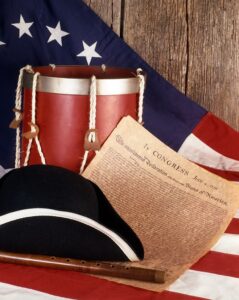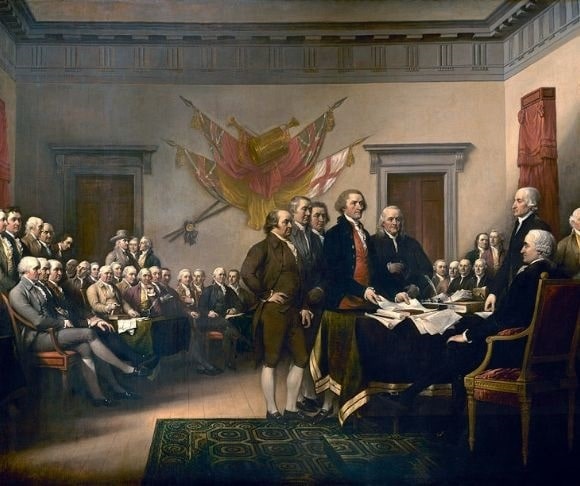It’s often said that history repeats itself. In 1776, Americans found themselves so oppressed and mistreated by their British masters that they felt there was no choice but to “dissolve the political bands which have connected them with another.” What followed was one of the most famous documents in history – the Declaration of Independence. Anyone who has never read it should; those who have should do so again. America has been sliding toward the wrong end of the liberty-tyranny scale since the Founders passed away. Mark Twain once argued it’s “not worth while to try to keep history from repeating itself, for man’s character will always make the preventing of repetitions impossible.” Perhaps he was right about the inevitability – but he could not have been more wrong about the value of trying.
Declaring Independence
Americans of the 18th century found themselves under the thumb of an oppressive government made up of elites who weren’t expected to live by the same rules as the lesser common folk. British soldiers often literally got away with murder because any “trials” held against them were mere political theater designed to stave off revolt by the abused. They endured heavy taxation and legislation dreamed up by the elite back in England without any say in the laws that governed them. Put simply, they were not treated as equals because they were not seen as equals.
“When in the course of human events, it becomes necessary for one people to dissolve the political bands which have connected them with another, and to assume among the powers of the earth, the separate and equal station to which the Laws of Nature and of Nature’s God entitle them, a decent respect to the opinions of mankind requires that they should declare the causes which impel them to the separation,” reads the first paragraph to the Declaration of Independence.
“We hold these truths to be self-evident, that all men are created equal, that they are endowed by their Creator with certain unalienable Rights, that among these are Life, Liberty and the pursuit of Happiness,” continued the Founders, fed up with being treated as if they were less than free men. “That to secure these rights, Governments are instituted among Men, deriving their just powers from the consent of the governed, That whenever any Form of government becomes destructive to these ends, it is the Right of the People to alter or abolish it, and to institute new Government, laying its foundation on such principles and organizing its powers in such form, as to them shall seem most likely to effect their Safety and Happiness.”
Such bold, beautiful words led to the creation of a nation which, despite devolving more and more into tyranny as time passes, remains even to this day home to some of the freest people on Earth.
Spirit of ’76, Where Are You?
But freer than most doesn’t necessarily mean as free as we once were or should be. It seems like the government has its fingers in every single pie, whether that’s requiring licenses to work or drive, surveilling and collecting data on every communication, or attempting to regulate every behavior. We tell ourselves we’re free, all the while bowing to the whims of those above us – no matter how ridiculous – for fear of incarceration or even death. Think that sounds overly dramatic? Go for a drive without a license, distill some whisky and try to sell it, or stop paying your taxes. When the men with guns arrive to carry you off, you either acquiesce or you end up in the ground. That is, of course, unless you’re a part of the government or the wealthy elites who run it. Then you’re golden, so long as it’s your people in power at the time.

(Photo by H. Armstrong Roberts/ClassicStock/Getty Images)
Yes, some laws are necessary, but few would deny that things have gotten entirely out of hand. Congress has enacted more than 30,000 statutes since 1789. There are so many laws that no one has an accurate number – even the government itself can only approximate – and that’s not even counting federal regulations created by the executive branch, which don’t go through the typical legislative process but often bear the same weight upon the shoulders of the people. In his book Three Felonies a Day, civil liberties lawyer Harvey Silverglate estimates that the average American violates at least three federal criminal laws every day without even realizing it – forget about misdemeanors and civil violations. As the number of laws increases, so too does the share of citizens who find themselves incarcerated. An article from The Economist in 2010 – titled “Too many laws, too many prisoners” – demonstrated that at the time roughly one in 100 adults were behind bars, compared to less than one in 400 back in 1970.
With federal, state, and local levies combined, we find our incomes taxed, our spending taxed, and, as if that weren’t bad enough, we must pay taxes annually on certain types of property just for the privilege of keeping what we already paid for, including the aforementioned multiple layers of taxation. We’re taxed in ways so imaginative that many miss the fact they’re still forms of tax. Want a car? The sticker price is only the beginning. Earning brings income tax. Spending brings sales tax. Owning brings personal property tax. But to use that car, you’re going to pay for a driver’s license that must be renewed from time to time as well as an annual registration fee for the vehicle. Then there’s an additional tax built into fuel prices to maintain the roads – which makes one wonder where that registration, driver’s license, and personal property tax money goes.
Today, the people are taxed and ruled over by a government of elites who seem to see themselves as our betters. There are still those who stand in the gap, fighting for freedom against every tyrannical proposal – and sometimes they win major battles. But more often than not, all they are able to accomplish is to slow the march of “progress” a bit. Perhaps things are not quite as bad as in the colonial days, but the “freedom” we have today is not anything the Founders would likely recognize. Can a reawakened Spirit of ’76 bring about a renewed independence for the common folk before what liberty remains is lost?




